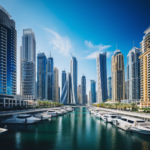
Top Factors Influencing Property Values in the UAE

The United Arab Emirates (UAE) has one of the most dynamic and rapidly evolving real estate markets in the world. The UAE’s property sector, dominated by hubs like Dubai and Abu Dhabi, is influenced by a myriad of factors, both micro and macro, which directly and indirectly affect property values. Understanding these factors is key for anyone involved in the real estate market, be it investors, developers, or individuals looking to buy or sell property. This article delves into the most significant factors influencing property values in the UAE.
1. Location
Arguably the most crucial factor in property valuation, location affects real estate prices dramatically. Areas with a reputation for being luxurious, such as Dubai’s Palm Jumeirah or Downtown Dubai, tend to have higher property values due to the prestige associated with these locations. Additionally, properties closer to amenities like schools, hospitals, shopping malls, and transportation hubs usually have higher values.
2. Property Size and Condition
The size and physical condition of a property play a crucial role in its valuation. Larger properties tend to command higher prices, but this is also dependent on efficient use of space and layout. A well-maintained property, with modern amenities and high-quality fixtures, will invariably command a higher price compared to a poorly maintained one.
3. Economic Climate
The overall health of the UAE’s economy significantly influences property values. During times of economic growth and prosperity, property values tend to rise as more people can afford to invest in real estate. Conversely, during economic downturns, property values can fall due to decreased demand.
4. Government Regulations
Government policies and regulations can also have a substantial impact on property values. For instance, in recent years, the UAE government has introduced policies to attract more foreign investors, such as allowing 100% foreign ownership of businesses and long-term residency visas for property investors. These initiatives can bolster demand and, consequently, property values.
5. Supply and Demand
The dynamics of supply and demand have a direct impact on property values. When there’s an oversupply of properties with not enough demand, prices can fall. In contrast, when demand outstrips supply, property values are likely to increase.
6. Infrastructure Development
Investments in infrastructure can lead to a rise in property values. Developments such as new roads, airports, or metro lines can increase the attractiveness of an area, making properties more valuable. The anticipation of Expo 2020 in Dubai, for instance, led to infrastructure expansion and development, subsequently increasing property values in certain areas.
7. Social and Cultural Factors
Social and cultural factors can also influence property values. For instance, areas with a strong sense of community, safety, and cultural appeal tend to be more attractive to buyers and command higher property values.
8. Interest Rates
Interest rates on home loans also affect property values. Lower interest rates can lead to higher property values as they make borrowing cheaper, increasing the number of potential buyers. The UAE has seen low interest rates in recent years, which has had a positive impact on the real estate market.
In conclusion, property values in the UAE are influenced by a host of factors, ranging from location and property condition to economic conditions and government regulations. These factors are interconnected, and shifts in one can often trigger changes in others. Understanding these influences is vital for anyone participating in the UAE’s real estate market, allowing them to make informed decisions and maximize their returns.




